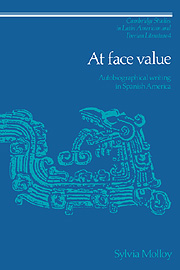Book contents
- Frontmatter
- Contents
- Acknowledgments
- Introduction
- PART I THE SCENE OF READING
- PART II CHILDHOOD AND FAMILY TALES
- PART III MEMORY, LINEAGE AND REPRESENTATION
- 8 Autobiography as history: a statue for posterity
- 9 Shrines and labyrinths: a place to remember
- 10 First memories, first myths: Vasconcelos' Ulises criollo
- Notes
- Bibliography
- Index
10 - First memories, first myths: Vasconcelos' Ulises criollo
Published online by Cambridge University Press: 14 September 2009
- Frontmatter
- Contents
- Acknowledgments
- Introduction
- PART I THE SCENE OF READING
- PART II CHILDHOOD AND FAMILY TALES
- PART III MEMORY, LINEAGE AND REPRESENTATION
- 8 Autobiography as history: a statue for posterity
- 9 Shrines and labyrinths: a place to remember
- 10 First memories, first myths: Vasconcelos' Ulises criollo
- Notes
- Bibliography
- Index
Summary
The history of Mexico is that of man in search of his filiation, his origin.
Octavio Paz, The Labyrinth of SolitudeAt first glance, José Vasconcelos appears to be a throwback to the figure of the heroic nineteenth-century writer-statesman, striving to combine intellectual reflection with direct political action and believing himself destined to play a leading role in the development of his country. In many aspects (the sense of a quasi-messianic calling not being the least of them) he reminds the reader of Sarmiento. Both men are educators, self-appointed “civilizers” of their barbarian compatriots (Vasconcelos espouses Sarmiento's simplistic yet effective formula, civilizatión y barbarie, which he translates into Mexican terms – Quetzalcóatl vs. Huichilobos), both perceive themselves as greater than nature and are eager to have others see them with the same generous eye. If Adolfo Prieto, borrowing from Karl Mannheim, found a matchless description for Sarmiento's overbearing, chaotic personality – “the gesticulating adult” – Francisco Madero himself, during the first days of the Mexican Revolution, echoed Nietzsche in his own, perfect characterization of Vasconcelos – “el supermuchacho,” Superboy. As in Sarmiento, there is indeed in Vasconcelos an element of near-adolescent instability coupled with a constant need for recognition; a fervent desire to do rivaled only by the desire to show himself doing; finally, a tendency to tantrums and overreactions that make him (again like Sarmiento) all the more vulnerable to criticism and jibes.
- Type
- Chapter
- Information
- At Face ValueAutobiographical Writing in Spanish America, pp. 186 - 208Publisher: Cambridge University PressPrint publication year: 1991



